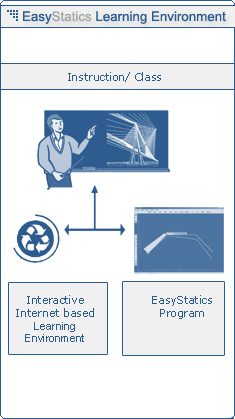| |
|
 |
Students and
teachers using EasyStatics
get access through the Internet to a specially
developed database. This allows teachers to prepare
demonstrations and home-works and distribute them
to a predefined
student group together with
the program and all needed background information.
|
 |
Specifically for teaching purposes
the functionality of EasyStatics has been extended
as follows:
 |
During program
execution a window can be opened where comments
can be written by the program user.
|
 |
All
data related to any number of computational
states (including
comments) can be saved in a file. These data
can later be used for resuming execution
from the saved state data or for generating
and
storing new ones.
|
|
 |
Imagine a homework
exercise defined by a teacher by means of an EasyStatics file
in which the data of one or more computational
states describing
some non-optimal configuration of a structure are
saved. In the related comment windows the teacher
asks the students to (somehow) optimize the structure.
|
 |
Via the Internet
the student gets the EasyStatics homework
file to be use for optimizing
the structure’s design. For this purpose
he has the full power of EasyStatics at
his disposal, meaning that he can modify the structure
at will
and instantaneously get all the results he needs.
When the original data are properly modified or
new state data have been created according to the
teacher’s
specifications he simply sends back to his teacher
or his assistants the modified home-work file.
|
 |
Similarly, demonstrations provided
by the teacher can be rerun at home and modified
at will.
|
|
 |
It is important
to note that the EasyStaticslearning platform
does not consist of a series of
predefined lectures, but is a tool teachers can
easily use to develop their lectures, demonstrations
and
homework assignments according to their own criteria.
Similarly, students can just “play” with
the program which – we think – can
be quite instructive.
|
|
 |
The EasyStatics
e-learning platform will be described in detail at the course
on march 26, 2004. (see
News)
|


